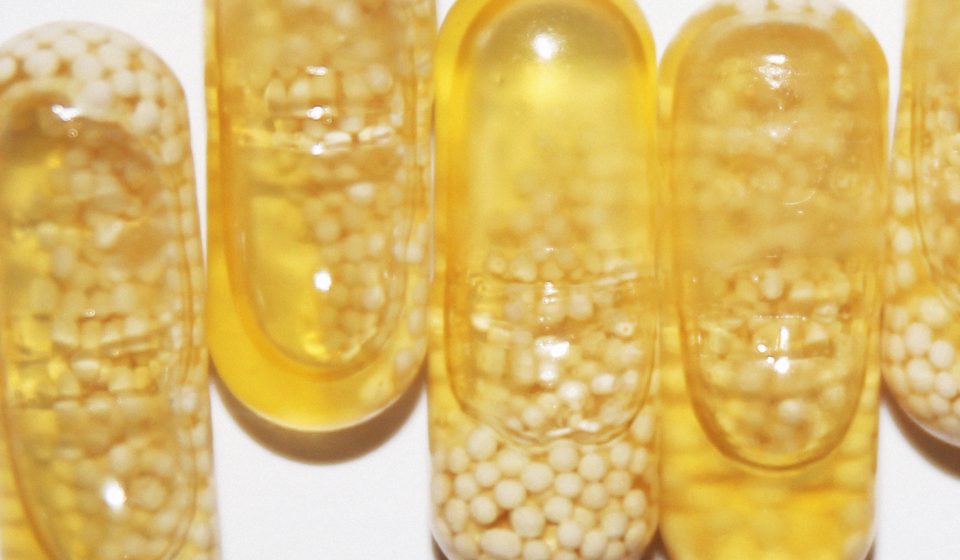2. More isn’t always more
It’s common practice (and now consumer expectation) to see a long list of nutrients packed into the traditional multivitamin. As it turns out, more is not always better. Overdosing on one nutrient may impact the intake or absorption of another.
Ritual completed a comprehensive review of the scientific literature to understand what nutrient gaps existed from the average diet and designed our products to help fill common nutrient gaps.*
3. Natural doesn’t always mean clean
A lot of people assume that plant-based nutrients are better just because they’re found in nature. Your body can’t tell the difference between a plant-based nutrient and an identical synthesized molecule made in a lab and oftentimes naturally derived nutrients can have a high sustainability footprint.
A good example is Ritual’s vitamin B12. While it is difficult to find large amounts from plant-based sources, it can be made in a lab to create vegan-friendly forms that are identical to the same nutrients found in nature.
4. Zoom in when you see “clinically studied”
When people see “clinically studied” they often interpret it to mean the whole formula has been clinically studied, which can be misleading. Whole product clinical trials are important to show that the finished formula you consume is having the desired nutritional benefits in the body, but they can be rare in the industry. Many companies use ingredients that have been clinically studied, but at different doses or in different forms than the actual studies.
Ritual has a university-led clinical trial on Essential for Women 18+ formula, published in Frontiers In Nutrition — a leading, internationally recognized, peer-reviewed journal. Ritual uses key clinically studied ingredients in matching doses and formats across the rest of our line.
5. Look for transparent, high quality ingredient suppliers
Guesswork doesn’t belong on your vitamin label. Part of knowing what’s going into your body is being able to trace where those ingredients come from. You want suppliers you can trust to ensure they are getting safe, high-quality ingredients, follow Good Manufacturing Practices, are sustainable and prioritize fair labor practices.
Ritual publishes the supplier name and final place of manufacturing for all of our active and other ingredients.
6. Ask about packaging sustainability
With packaging, finding new use for old materials is one of the most planet-conscious decisions companies can make. Look for companies that set sustainability goals and use materials like post consumer resin (PCR) and leverage packaging sustainability tools like Bluebird Climate.
Ritual set a goal to have 100% sustainable packaging (recyclable, refillable or recycled) by 2025, and at the end of 2022 was 74% of the way to meet that goal.
7. Transparency in testing
Third-party testing isn’t a requirement, and many companies choose not to, due to the high cost. If a brand isn’t transparent about their testing, email their customer service line to ask which tests are conducted. You should hope to hear about micro, allergen, and contaminant testing like heavy metals.
Ritual has a publicly available tool, called our Certificate of Traceability, where you can see the key tests that are conducted on all of our products. We even show the test results for heavy metals for our recent batches of protein powder.
8. Certifications that count
Certifications that are relevant and important to the vitamin category include USP Verification, Non-GMO Verified Project, USDA Organic, Clean Label Project, NSF, Informed Sport, Informed Choice, Vegan Certified, and Cruelty Free & Vegan.
Ritual has many of these certifications, which can be seen on a per product basis through our Certificate of Traceability.
9. Support Certified B Corporations
The list of Certified B Corporations in the vitamin industry is short, but it’s widely considered the gold standard for responsible business. Being a Certified B Corp company means that a brand has substantiated their employee benefits, how well they assess and monitor their supply chains for environmental or human rights issues, the credibility of their give back programs and ensures that business decisions are never solely made on the basis of delivering for shareholders, but embrace a “triple bottom line”.
Ritual is a Certified B Corporation.
10. Too Good to Be True?
While the FDA oversees the supplements industry through the Dietary Supplement Health and Education Act (DSHEA), they have limited authority and are frankly often too under-resourced to ensure the safety and efficacy of the 80,000+ supplements on the market. Passing new laws will level the playing field and increase access to safe supplements.
Ritual rolled out its Traceable Wellness Policy Roadmap to the 118th Congress and actively lobbies for the FDA to establish health-protective limits on heavy metals in supplements and protein powder, and to clearly define how brands can use “clinically studied”.
These statements have not been evaluated by the Food and Drug Administration. This product is not intended to diagnose, treat, cure, or prevent any disease.










